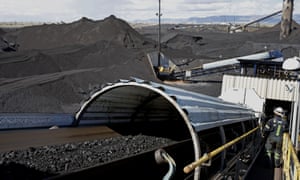Chinese state media has lambasted Donald Trump’s efforts to roll back many Obama-era environmental regulations,
with a state-run tabloid saying that: “No matter how hard Beijing
tries, it won’t be able to take on all the responsibilities that
Washington refuses to take.” In an editorial highly critical of Trump’s retreat
on environmental regulation, the Global Times made it clear Beijing was
uncomfortable taking over leadership of the fight against climate
change and could not fill the vacuum left by the US.
“Western opinion should continue to pressure the Trump administration on climate change. Washington’s political selfishness must be discouraged,” the editorial said. “China will remain the world’s biggest developing country for a long time. How can it be expected to sacrifice its own development space for those developed western powerhouses?”
China is the largest emitter of greenhouse gases responsible for global warming, followed by the US, and Chinese leaders firmly agree climate change is a real threat. Their rhetoric has often outpaced their commitments to curb emissions and the country also consumes more coal than the rest of the world combined, although coal use has plateaued in recent years.
“China is not the kind of leader in terms of climate change that will
pull other countries along,” said Lauri Myllyvirta, a senior campaigner
at Greenpeace based in Beijing. “The Chinese government will only
commit to targets it is very comfortable delivering and it needs to work
with other major countries. China won’t strike out on its own.”
China is both the worlds largest exporter of renewable energy, and at the same time one of the leading exporters of coal-fired power plants.
Trump has also threatened to pull out of the Paris climate agreement, putting him at odds with China’s president Xi Jinping who has said the “hard-won” deal should remain in force. “All signatories should stick to it instead of walking away from it, as this is a responsibility we must assume for future generations,” Xi said at the World Economic Forum in January.
Even ExxonMobil, America’s largest oil company, has said the US should not back out of its commitments under the accord.
The Global Times editorial said: “Washington is supposed to take the lead in the global fight against climate change but the Trump administration could be the first to ditch the agreement, which is disappointing.”
Trump has previously repeatedly called climate change a “hoax” and without proof has blamed China for rising temperatures. “The concept of global warming was created by and for the Chinese in order to make US manufacturing non-competitive,” he said in a 2012 tweet.
China has committed to having its emissions peak by 2030 as part of a deal with the US, but many forecasts say the country will reach that target years ahead of schedule.
For people living in smog-choked Chinese cities, relief might seem far off. Beijing plans to meet Chinese national air quality standards by 2030, but those levels are still three-and-a-half times higher than those recommended by the World Health Organisation.
China has invested heavily in renewables, but coal remains heavily used in the power, steel and cement industries.
“Western opinion should continue to pressure the Trump administration on climate change. Washington’s political selfishness must be discouraged,” the editorial said. “China will remain the world’s biggest developing country for a long time. How can it be expected to sacrifice its own development space for those developed western powerhouses?”
China is the largest emitter of greenhouse gases responsible for global warming, followed by the US, and Chinese leaders firmly agree climate change is a real threat. Their rhetoric has often outpaced their commitments to curb emissions and the country also consumes more coal than the rest of the world combined, although coal use has plateaued in recent years.
China is both the worlds largest exporter of renewable energy, and at the same time one of the leading exporters of coal-fired power plants.
Trump has also threatened to pull out of the Paris climate agreement, putting him at odds with China’s president Xi Jinping who has said the “hard-won” deal should remain in force. “All signatories should stick to it instead of walking away from it, as this is a responsibility we must assume for future generations,” Xi said at the World Economic Forum in January.
Even ExxonMobil, America’s largest oil company, has said the US should not back out of its commitments under the accord.
The Global Times editorial said: “Washington is supposed to take the lead in the global fight against climate change but the Trump administration could be the first to ditch the agreement, which is disappointing.”
Trump has previously repeatedly called climate change a “hoax” and without proof has blamed China for rising temperatures. “The concept of global warming was created by and for the Chinese in order to make US manufacturing non-competitive,” he said in a 2012 tweet.
China has committed to having its emissions peak by 2030 as part of a deal with the US, but many forecasts say the country will reach that target years ahead of schedule.
For people living in smog-choked Chinese cities, relief might seem far off. Beijing plans to meet Chinese national air quality standards by 2030, but those levels are still three-and-a-half times higher than those recommended by the World Health Organisation.
China has invested heavily in renewables, but coal remains heavily used in the power, steel and cement industries.

No comments:
Post a Comment